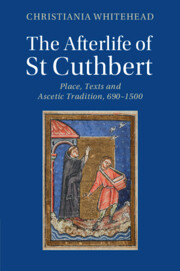Book contents
- The Afterlife of St Cuthbert
- Cambridge Studies in Medieval Literature
- The Afterlife of St Cuthbert
- Copyright page
- Contents
- Abbreviations
- Acknowledgements
- Introduction
- Chapter 1 Blessings on Pregnant Seals: Constructing Cuthbert’s Asceticism in His Anonymous and Bedan vitae, and the Historia ecclesiastica, 690–740
- Chapter 2 Travels with My Coffin: The Dislocation and Defence of the Community of St Cuthbert in the Historia de Sancto Cuthberto, 793–1050
- Chapter 3 The Bishop in the Rain: Celebrating the New Order in Symeon of Durham’s Libellus de exordio, Old English Durham and the Capitula de miraculis et translationibus sancti Cuthberti, 1066–1140
- Chapter 4 Expansions and Contractions of Saintly Space in Two Cuthbertine Miracle Collections: Reginald of Durham’s Libellus de admirandis, and De mirabilibus, 1150–1210
- Chapter 5 Godric of Finchale, Bartholomew of Farne and the ‘Irish’ Libellus de ortu Sancti Cuthberti: Three Eremitic Responses to St Cuthbert, 1150–1210
- Chapter 6 Delimiting Sanctity in Two Meditations from Farne Island: The Exortacio ad contemplacionem and the Meditaciones of the Monk of Farne, 1210–1370
- Chapter 7 Vernacular Epitomes and Encyclopedias: Southern Legendaries and the Metrical Life of St Cuthbert, 1270–1500
- Conclusion
- Notes
- Bibliography
- Index
- Cambridge Studies in Medieval Literature
Conclusion
Published online by Cambridge University Press: 03 December 2020
- The Afterlife of St Cuthbert
- Cambridge Studies in Medieval Literature
- The Afterlife of St Cuthbert
- Copyright page
- Contents
- Abbreviations
- Acknowledgements
- Introduction
- Chapter 1 Blessings on Pregnant Seals: Constructing Cuthbert’s Asceticism in His Anonymous and Bedan vitae, and the Historia ecclesiastica, 690–740
- Chapter 2 Travels with My Coffin: The Dislocation and Defence of the Community of St Cuthbert in the Historia de Sancto Cuthberto, 793–1050
- Chapter 3 The Bishop in the Rain: Celebrating the New Order in Symeon of Durham’s Libellus de exordio, Old English Durham and the Capitula de miraculis et translationibus sancti Cuthberti, 1066–1140
- Chapter 4 Expansions and Contractions of Saintly Space in Two Cuthbertine Miracle Collections: Reginald of Durham’s Libellus de admirandis, and De mirabilibus, 1150–1210
- Chapter 5 Godric of Finchale, Bartholomew of Farne and the ‘Irish’ Libellus de ortu Sancti Cuthberti: Three Eremitic Responses to St Cuthbert, 1150–1210
- Chapter 6 Delimiting Sanctity in Two Meditations from Farne Island: The Exortacio ad contemplacionem and the Meditaciones of the Monk of Farne, 1210–1370
- Chapter 7 Vernacular Epitomes and Encyclopedias: Southern Legendaries and the Metrical Life of St Cuthbert, 1270–1500
- Conclusion
- Notes
- Bibliography
- Index
- Cambridge Studies in Medieval Literature
Summary
This book offers its readers a textual tradition, in the sense of identifying a coherent lineage of texts relating one to the other, re-addressing an idea that has not always found favour in scholarly circles. Late twentieth-century critics reacted against the textual closure and teleological assumptions of earlier accounts of tradition, which conventionally plotted an origin, heyday and moment of decay. Rather than returning to this narrative, I join with other new proponents of ‘tradition’ in identifying a set of relationships between texts which is neither progressive nor regressive, but simply ‘diachronically non-directed’. I also resist the idea of treating my texts as interlocutors within a closed and sealed textual system, placing them instead in an ongoing dialectic with historical events perceived at an institutional, regional and national register.
- Type
- Chapter
- Information
- The Afterlife of St CuthbertPlace, Texts and Ascetic Tradition, 690–1500, pp. 224 - 233Publisher: Cambridge University PressPrint publication year: 2020

